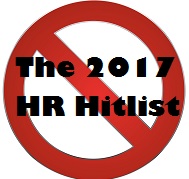 Note: This is the second in a series of five articles from thought leader Jason Lauritsen that will post on Mondays through Feb. 20. Called the 2017 HR Hitlist, each article outlines one practice or behavior that HR needs to eliminate in 2017 and how to do it. The articles originally appeared on the Small Improvements blog. Find the first post here.
Note: This is the second in a series of five articles from thought leader Jason Lauritsen that will post on Mondays through Feb. 20. Called the 2017 HR Hitlist, each article outlines one practice or behavior that HR needs to eliminate in 2017 and how to do it. The articles originally appeared on the Small Improvements blog. Find the first post here.
One of my favorite movies is the classic Quentin Tarantino film, Pulp Fiction.
There’s a character in the movie who they refer to as “The Wolfe.” He’s a fixer. When someone screws up or makes a serious mess, they call The Wolfe. He shows up to save the day by making the problem  disappear.
disappear.
I think this is how management often thinks of HR — as their own personal version of “The Wolfe.” When an uncomfortable conversation is needed or they’ve made a mess with an employee, they call HR. And, since we love to feel needed in HR, we swoop in and handle things. The manager’s problem disappears. Everybody wins, right?
Wrong.
Here’s the problem: “The Wolfe” in Pulp Fiction is not a good guy. In fact, he’s a very bad guy who helps other bad guys cover up the bad things they’ve done. He’s an enabler of really bad behavior.
When HR swoops in like The Wolfe to take over for a manager in uncomfortable conversations, we enable bad behavior. When we help them cover up that they aren’t managing their employees’ performance diligently, we enable bad behavior.
When managers don’t feel the consequences of their behavior, there’s no fuel for change. Bad managers continue practicing bad management, HR continues trying to fix it, and employees continue paying the price.
It’s time to stop enabling bad managers
We need to own that despite our best intentions, we are part of the problem in HR. We need to stop trying to fix the situation and start coaching the manager.
One of the most important roles that HR should play is to ensure the organization has good people management practices. This may require a shift in your thinking.
Here is what it looks like to fulfill this role.
Clearly outline the role of the manager — This is an often overlooked, yet critically important step. By clearly articulating expectations and the associated accountabilities in detail, you create great clarity for the manager. Reinforce that they are the primary source of communication, feedback and encouragement for the employee. This means they are responsible for both the fun and the not-so-fun parts of the job.
Clearly outline the role of HR in supporting managers — Part of the challenge for HR is that managers aren’t always clear about human resources’ role. Being explicit about what you will and won’t do up front limits the number of “fix it” requests you receive and makes it easier to push back when you do.
Coach, don’t fix — When a manager asks you to do their job for them, don’t enable them by saying yes. Instead, remind them that it’s their job to coach employees. Start with this: “Tell me how you’d approach the conversation.” Provide them with ideas and suggestions to prepare them for success. Then, make a commitment to follow up after the conversation so you can coach some more. Ask what went well and what they’d do differently next time. Soon, they’ll develop the skills they need so they won’t need to call you in the first place.
Let them clean up their own messes: The pain of consequences is a powerful motivator for change. HR should not try to remove this pain. When a manager fails to confront a performance problem with an employee for months, then suddenly wants to fire that employee, there should be some consequences for that manager. Because despite their desire to fire, they likely need to spend time working with the employee and giving them an opportunity to turn things around. It may also be valuable to involve the manager’s manager to ensure the issue is taken seriously. Once managers learn that you aren’t going to bail them out, they will be more likely to do their job and avoid the consequences of not doing so.
It’s often said that employees join organizations, but they leave managers. If we are to win the war for talent, we must stop enabling and start coaching for better managers today.
